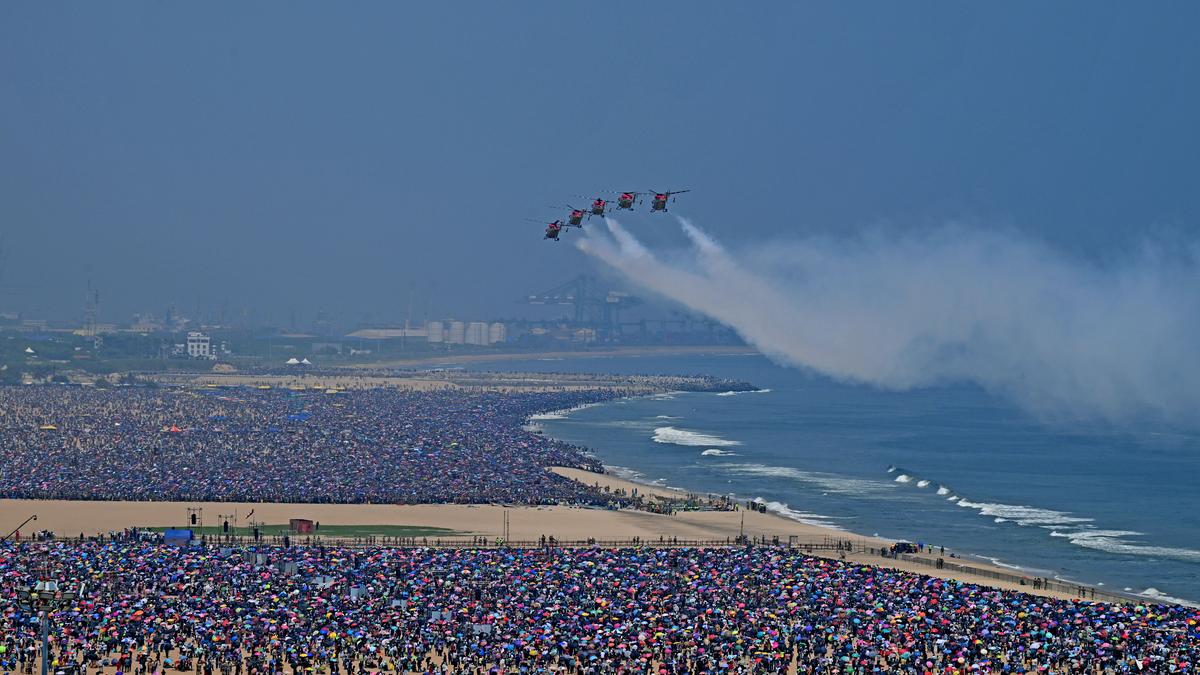On October 6, a tragic event occurred during an air show at Marina Beach in Chennai, organized by the Indian Air Force (IAF) to celebrate its 92nd anniversary. Sadly, five people lost their lives due to heat-related issues, primarily heatstroke. Many others, over 200 in total, fainted because of the extreme heat, which reached around 34°C to 35°C. Although the IAF had issued warnings advising attendees to protect themselves from the heat, many people still complained of dizziness and discomfort after the show.
The local health officials reported that 102 individuals were taken to nearby government hospitals for treatment due to heat-related problems. The situation was further complicated by severe traffic congestion in Chennai, which lasted for hours. Public transport systems like the Metro Rail and the Mass Rapid Transit System (MRTS) were overcrowded, and the train stations were extremely congested. This lack of adequate transportation added to the chaos surrounding the event.
In response to the tragic loss of life, Tamil Nadu’s Chief Minister, M.K. Stalin, announced that each family of the deceased would receive a financial aid of ₹5 lakh (approximately $6,000). He explained that the heavy traffic was a result of the overwhelming number of people attending the event, despite various government departments coordinating the preparations.
Chennai has hosted similar air shows in the past, including one in September 2003, which attracted around 1.3 million people without any fatalities from heatstroke. However, there were still issues such as children going missing and chaotic traffic management. The article suggests that important lessons from previous events have not been learned, as the same problems reoccurred during this year’s show. It points out that both the state government, which was responsible for logistical support and the railway administration, which failed to provide adequate transportation, share the blame.
Defence officials should have also played a more proactive role in ensuring that the event went smoothly, drawing on their experience from conducting similar events across the country. Although Health Minister M. Subramanian claimed that the government had met all the IAF’s requirements, complaints from attendees about insufficient toilets and drinking water indicated otherwise.
To prevent such tragedies in the future, the article suggests several improvements. For example, authorities could have limited the number of people allowed at Marina Beach, set up giant screens to livestream the air show, and recruited volunteers from universities to assist with crowd control and medical emergencies.
Overall, the article emphasizes the need for better planning, coordination, and resource management for large public events to ensure the safety and well-being of all attendees.
.
.
.
join our telegram channel for regular updates of The Hindu Epaper Editorial Explanation-https://t.me/Thehindueditorialexplanation
The Hindu Epaper Editorial Explanation given by Hello Student is only a supplementary reading to the original article to make things easier for the students.
In conclusion, preparing for exams in India can be a daunting task, but with the right strategies and resources, success is within reach. Remember, consistent study habits, effective time management, and a positive mindset are key to overcoming any academic challenge. Utilize the tips and techniques shared in this post to enhance your preparation and boost your confidence. Stay focused, stay motivated, and don’t forget to take care of your well-being. With dedication and perseverance, you can achieve your academic goals and pave the way for a bright future. Good luck!
The Editorial Page of The Hindu is an essential reading for all the students aspiring for UPSC, SSC, PCS, Judiciary etc or any other competitive government exams.
This may also be useful for exams like CUET UG and CUET PG, GATE, GMAT, GRE AND CAT
To read this article in Hindi –https://bhaarat.hellostudent.co.in/

